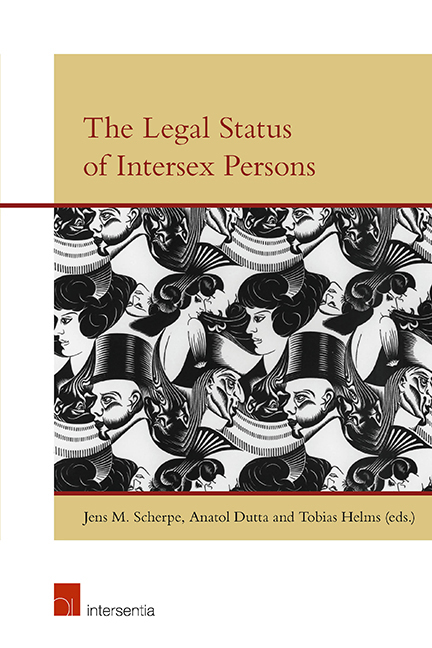Book contents
- Frontmatter
- Preface
- Contents
- List of Contributors
- The Legal Status of Intersex Persons: An Introduction
- Malta Declaration
- Darlington Statement
- Vienna Statement
- PART I MEDICINE AND PSYCHOLOGY
- PART II THEOLOGY AND LEGAL HISTORY
- PART III TRANSGENDER, TRANSSEXUALITY AND INTERSEX
- PART IV NATIONAL LEGAL DEVELOPMENTS
- Australia
- Sweden
- India
- The Netherlands
- France
- Colombia (The Colombian Constitutional Court)
- United States
- Malta
- Germany (The 2013 German Law)
- Germany (German Inter-Ministerial Working Group)
- Germany (Gender Diversity in Law)
- PART V PRIVATE INTERNATIONAL LAW ASPECTS OF INTERSEX
- PART VI INTERSEX AND HUMAN RIGHTS
Sweden
from PART IV - NATIONAL LEGAL DEVELOPMENTS
Published online by Cambridge University Press: 31 January 2019
- Frontmatter
- Preface
- Contents
- List of Contributors
- The Legal Status of Intersex Persons: An Introduction
- Malta Declaration
- Darlington Statement
- Vienna Statement
- PART I MEDICINE AND PSYCHOLOGY
- PART II THEOLOGY AND LEGAL HISTORY
- PART III TRANSGENDER, TRANSSEXUALITY AND INTERSEX
- PART IV NATIONAL LEGAL DEVELOPMENTS
- Australia
- Sweden
- India
- The Netherlands
- France
- Colombia (The Colombian Constitutional Court)
- United States
- Malta
- Germany (The 2013 German Law)
- Germany (German Inter-Ministerial Working Group)
- Germany (Gender Diversity in Law)
- PART V PRIVATE INTERNATIONAL LAW ASPECTS OF INTERSEX
- PART VI INTERSEX AND HUMAN RIGHTS
Summary
LEGAL FRAMEWORK AND STATISTICS
OVERVIEW
In many respects, Sweden was once considered a pioneering nation in the regulation of juridical gender. In 1631, Sweden became the first country in the world to establish a population registry for its inhabitants – a registry that reflected acknowledgement over time of the existence of persons who could not be classified simply as ‘male’ or ‘female’. In 1972, Sweden also became the first country in the world to enact a national scheme for changing one's registered gender, providing gender-affirming medical care in connection with such changes. The Gender Classification Act at the centre of this scheme, however, also appears to have been the first national law to endorse not only sterilisation of transgender persons, but to provide a mechanism for parents to seek changes of registered gender for children born with intersex conditions, as well as gender-conforming surgery on those children, without the children's consent. The Act emerged from the first known governmental investigation in the world to recognise the class of intersex persons – a class defined as persons who suffer from social conflict with gender registration. Though the experts that led the investigation concluded that the classes of ‘males’ and ‘females’ did not scientifically permit easy categorisation of many individuals, they nevertheless advocated that these classes should be maintained for socio-legal purposes and that all persons should be determined to ‘belong’ to one of these classes under strict legal controls. This legal scheme is expected to undergo significant transformation in 2018, as the government has announced plans to abolish the Gender Classification Act and to authorise simpler administrative changes of registered gender without any medical preconditions, with at least one such change as a matter of right.
Sweden, however, also shapes and controls juridical gender through a more far-reaching law that medicalises gender identity as binary. the Population Registration Act directs medical personnel to provide data on the gender of an infant as part of the child's juridical registration, despite governmental concessions that no sound definition exists of what constitutes a ‘male’ or ‘female’.
- Type
- Chapter
- Information
- The Legal Status of Intersex Persons , pp. 255 - 280Publisher: IntersentiaPrint publication year: 2018



